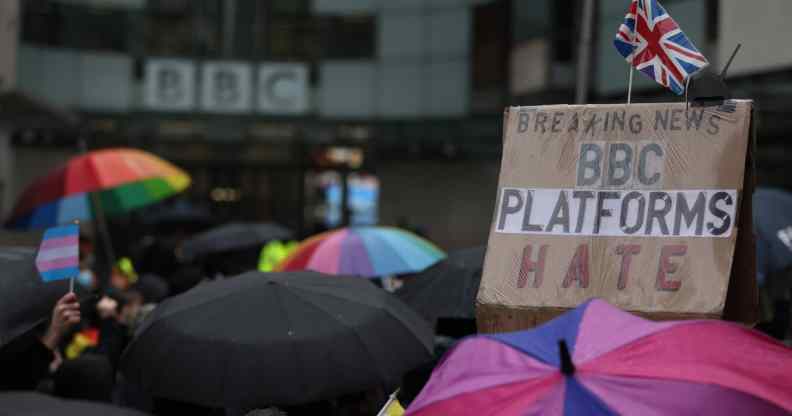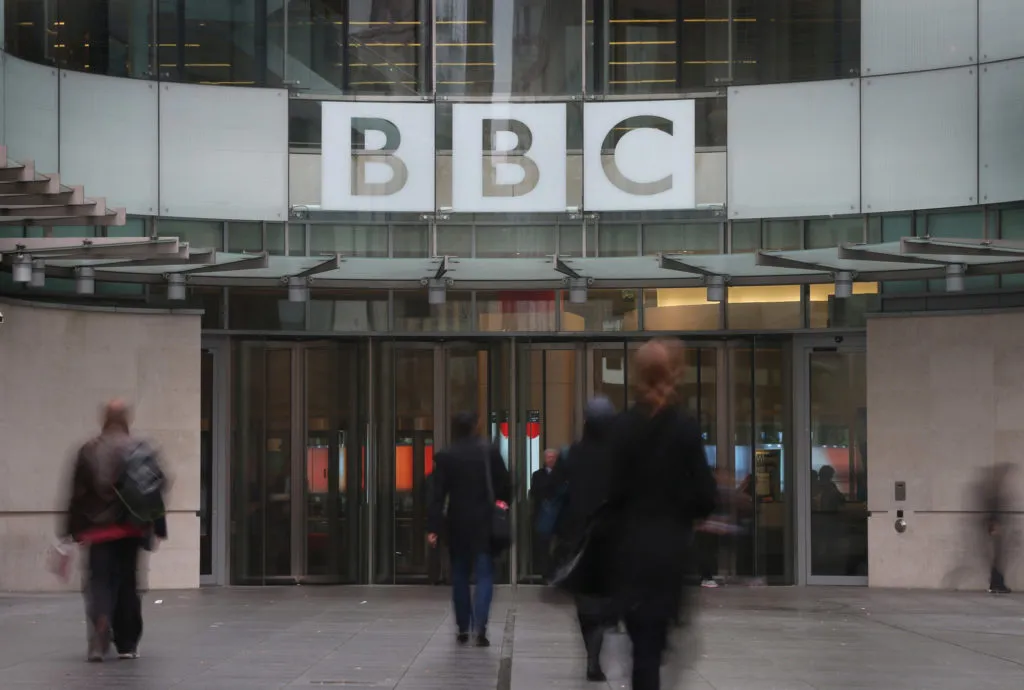BBC article claiming cis lesbians ‘pressured into sex by trans women’ found to be misleading

Demonstrators attend the Trans Activism UK’s ‘British Bigotry Corporation: Platforming Hate Is Not Impartial’ protest at BBC Broadcasting House, 2021. (Hollie Adams/Getty)
A story by the BBC claiming cis lesbians are being “pressured into sex” by trans women fell below the broadcaster’s editorial standards, the company’s complaints team has found.
The story, written by BBC News journalist Caroline Lowbridge, drew stiff criticism among LGBTQ+ campaign groups and even cis women.
The publication of the dangerous story on 26 October 2021 led to protests outside BBC offices in several cities and queer staff resigning in droves. Many saw it as the latest in a legacy of anti-trans coverage from the BBC.
The BBC’s Executive Complaints Unit (ECU) said Tuesday (31 May) that following a “significant number of complaints” about the story, the department’s head launched a review.
In a lengthy reply, the ECU said that the article, “though a legitimate piece of journalism overall, fell below the BBC’s standards of accuracy”.
Partly upholding the complaints, the ECU poked holes into the article when it came to accuracy. Its headline, “We’re being pressured into sex by some trans women,” for example, was found to be misleading.
The headline “gave the impression that the focus of the article would be on pressure applied by trans women, whereas its focus was at least as much on internalised pressure experienced by some lesbians as a result of a climate of opinion (as they perceived it) within the LGBT community, rather than pressure directly applied by trans women,” the ECU said.
Many of those interviewed, the ECU added, did not give accounts of trans women coercing them. Rather, they held “internalised beliefs” about trans people “as a result of a climate of opinion (as they perceived it) within the LGBT community”.
The ECU also faulted Lowbridge’s use of a 2019 self-selected survey by Get the L Out, an anti-trans group. The survey relied on just 80 respondents yet the story gave the impression the issue was a “widespread, or even a majority, experience among lesbians”.
The survey, the ECU said, lacked “statistical validity” and Lowbridge did not make clear that the “Get the L Out has an agenda (as an organisation which believes ‘transactivism erases lesbians, and silences and demonises lesbians who dare to speak out’) which the results of the survey appeared to serve”.
“To the extent that the article failed to exercise the appropriate degree of scepticism in its treatment of the survey, it fell below the BBC’s standards of due accuracy,” the ECU continued.
But while the ECU upheld some complaints, others were tossed out.
The ECU said the story did not perpetuate “harmful and negative stereotypes” about trans women because there is “no consensus on what constitutes a transphobic view”. This loophole meant the story “sufficiently” met the corporation’s impartiality guidelines.
“It also follows that the elements of inaccuracy identified earlier in this finding would not have contributed towards the creation of a harmful or negative stereotype, even though they may have conduced to an exaggerated impression of the incidence of the concerns addressed in the article,” the report added.
The department also said that referring to trans women as “biological males” does not amount to misgendering them.

The BBC Editorial Policy Department was today sent a letter by the UK’s 10 biggest LGBT+ groups who have united in support of the transgender community. (Peter Macdiarmid/Getty)
The article initially platformed transphobic adult entertainer Lily Cade, who has been accused by multiple women of sexual assault. BBC bosses claimed they were not aware of this at the time.
The ECU found otherwise. Bosses “acknowledged, however, that [Cade] had admitted to behaviour which she now recognised as sexually abusive in a Zoom conversation in September 2020, which had escaped attention by the time the article was ready for publication over a year later.
“In the context of the article, this information would have helped readers to judge her comments in the light of her own actions, and it was regrettable that it was not included.”
The BBC eventually removed Cade from the story when it was discovered she called for the mass “execution” and “lynching” of trans women. The story was not removed, however.
The ECU said the BBC’s choice to withdraw Cade’s quotes and add an amendment to the story was “appropriately addressed”.
In its report, the ECU acknowledged that Lowbridge spoke with trans sex worker Chelsea Poe, who told PinkNews she’d informed the journalist about the sexual-assault allegations against Cade prior to publication – but her quotes were not used because she didn’t “fit their narrative“, she said.
Lowbridge interviewed Poe despite writing in the article that no “high-profile” trans people agree to speak with her.
The ECU said that while considering someone “high-profile” or not is entirely subjective, it is not a “serious inaccuracy” to say Poe would not count as “high-profile”.
But to Trans Activism UK, a grassroots group that organised several protests against the BBC, the ECU’s response was “disappointing”. It could have been so much more, the group told PinkNews.
“In our view, while this is progress and a minor victory, it is far from what we were hoping to see and is ultimately not a suitable response,” Trans Activism UK said in a statement.
“We have made some progress, but this response does not change our feelings on the harm the BBC caused, and risks causing again in future.”
After all, Trans Activism UK said, the story remains on the BBC website to this day. The original headline even still appears when searched on Google and posted on social media websites.
“The response also disappointed us in several places, including the BBC’s allegation that “there is no consensus on what constitutes a transphobic view’,” the group added.
“As such the BBC’s belief that anti-trans views don’t need to be de-platformed under due impartiality the way homophobic views would be.”
The BBC said in a statement: “While the ECU ruling today rightly confirms the focus of the article was a legitimate area for journalistic scrutiny, it is also a reminder that the precision of our language and the caveats we place around third-party research are very important in our journalism, particularly when covering topics of highly polarised debate.
“In the light of the ECU ruling, the BBC has now made some amendments to the story to reflect where we got things wrong.”
“While individual news items tend to scrutinise very specific areas of debate, it’s important for the BBC to find opportunities to step back and help audiences understand the current arguments, and how they are reflected within wider society today, both in the UK and internationally,” it added.
But Trans Activism UK expects a lot more from the BBC.
“The piece acknowledges some of our complaints about the piece,” Trans Activism UK said, “but stops short of apologising or taking steps to undo the damage caused by the article.”

